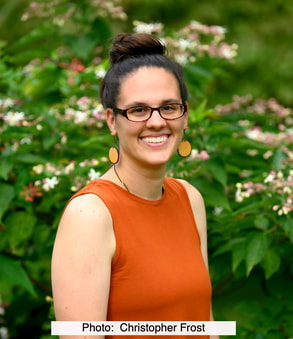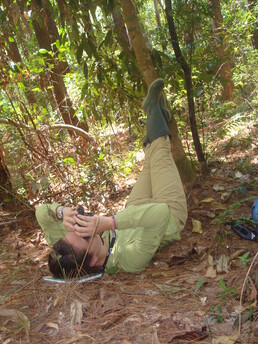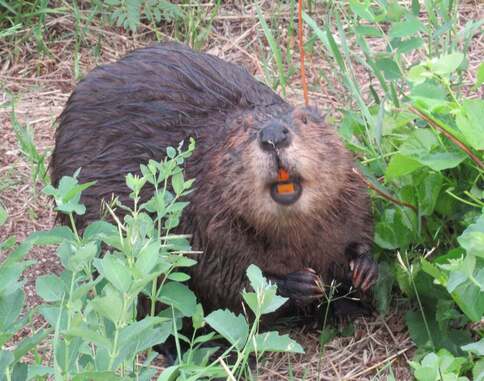 Photo: Christopher Frost Photo: Christopher Frost CLICK HERE to watch Alison Zak's October 2022 presentation. NOTE -- the first 9 minutes have captions but poor audio quality. This is remedied for the final 51 minutes. Alison Zak, born in Tampa, Florida, earned her undergraduate degree at the University of South Florida, and then went on to get her masters in anthropology at San Diego State University where she studied primatology and human-wildlife conflict. She worked for six years in environmental education and outreach, including at the Potomac Valley Audubon Society, the National Zoo, and most recently at the Clifton Institute. Alison is also an Emerging Wildlife Conservation Leader (Class 9), writer, and yoga teacher. Alison is founder of the Human-Beaver Coexistence Fund (HBCF), an organization dedicated to educating the public about the benefits of coexisting with beavers. The organization provides informational resources and financial support to help address human-beaver conflict using nonlethal management strategies. Partners include the Clifton Institute, Potomac Valley Audubon Society, Green Muslims, Old Town’s Open Book, the Animal Welfare Institute, and Beaver Institute. When and how did you become interested in nature and the natural world? Like most children, Alison was always interested in nature. She had a large collection of stuffed animals as a 5-year old, and when she was in 3rd grade her grandfather gave her a bird field guide to use, which made her decide she wanted to be an ornithologist. She often observed the interaction of people with nature and noted that nature was often discussed as if “people weren’t part of nature.”  Photo: Alison Zak Photo: Alison Zak After becoming a yoga instructor, Alison took great joy in incorporating mindfulness practices in outdoor programs to inspire curiosity and compassion and enhance her clients’ connection with nature. She is fascinated with the many poses that have names associated with nature (e.g., pigeon, downward facing dog, cow-face and of course, Sun Salutation). Alison began to read non-fiction books and essays that discussed the intersection of people and animals and to write about the intersection between people and nature. She also participated in a “pitch competition” on Twitter that resulted in an editor choosing her book proposal on using yoga to connect with animals and nature. Alison's book, Wild Asana, is scheduled to come out in summer 2023. Describe what you do on your property to support a healthy ecosystem. “My husband and I have a townhome in Oakton,” Alison said. “Like most townhomes we have a small fenced-in yard.” They decided about a year ago to convert everything to native plants, with the exception of a single raised bed for growing their own food. They put in two pawpaw trees and “we have even put pots with native plants along the fence outside our yard to extend that ‘natural environment’ and so far no one has complained yet!” Alison and her husband also convinced the townhome association's pest control company not to spray along their fence line. The pest control technician highlighted that the spray would kill spiders--thinking that would be a selling point for the “woman of the house." “My husband said, ‘You don’t know my wife.' "  North American beaver (Castor canadensis), Photo: Alison Zak North American beaver (Castor canadensis), Photo: Alison Zak What is the most amazing thing you have experienced in nature? “All of my most amazing and profound nature experiences are in the mountains,” Alison explained. “I feel a sense of connection in the mountains that I don’t feel elsewhere. I feel the love of my grandparents and ancestors in the mountains of West Virginia, my favorite state. I feel closest to the divine above tree line in Rocky Mountain National Park ‘where the sky is the size of forever and the flowers are the size of a millisecond’ (quote by Ann Zwinger). And a few years ago I felt the sheer thrill of sharing habitat with snow leopards (even if I didn’t see them!) in the Indian Himalayas.” What is something you would like to share with ORMN members? “I would like ORMN members to encourage friends and neighbors to view beavers as a ‘natural change agent’ - a species that changes the environment as a part of the natural cycle of life.” Alison noted that beaver activity to create ponds often results in damage to trees as well as flooding of agricultural land. While she is a big supporter of this natural activity, she also realizes that it may jeopardize the income and well-being of landowners. She pointed out that her organization’s name – Human-Beaver Coexistence Fund – has “Human” as the first noun. The well-being of humans and beavers are of equal concern to HBCF! Interviewed by Charlene Uhl, September 2022
0 Comments
Your comment will be posted after it is approved.
Leave a Reply. |
AuthorWrite something about yourself. No need to be fancy, just an overview. Archives
December 2023
Categories
All
|
 RSS Feed
RSS Feed